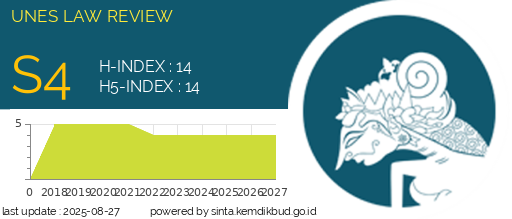Kebijakan Perizinan Berusaha di Indonesia dan Kepastian Hukum bagi Investor Pasca Putusan Inkonstitusional Bersyarat UU Cipta Kerja
DOI:
https://doi.org/10.31933/unesrev.v6i1.892Keywords:
Business Licensing, Investment, PolicyAbstract
The development and progress of investment activities is one of the things that has a very large role for the movement of the national economy. In order to maintain national economic stability, the government opens opportunities for investors with various facilities provided by Law Number 11 of 2020 concerning Job Creation (“Job Creation Law”). However, it is known the Job Creation Law was declared conditionally unconstitutional by the Constitutional Court Decision Number 91/PUU-XVIII/2020. Clarity is urgently needed regarding all regulations related to investment in order to realize the main objectives of the investment activity itself and to avoid all difficulties related to licensing bureaucracy. This normative research seeks to describe the business licensing policies after the Job Creation Law, the government's attitude towards the formal test decisions of the Job Creation Law, especially legal certainty for investors after the unconstitutional conditions of the Job Creation Law. Based on the research results, it is known that in order to guarantee legal certainty, investors should be able to continue carrying out their business activities on the basis of the Job Creation Law and its implementing regulations.
Downloads
References
Bariun, La Ode. (2021). Masa Depan Otonomi Daerah Terhadap Keberlakuan Undang-Undang Cipta Kerja (Resentralisasi ataukah Desentralisasi). Disertasi Fakultas Hukum Universitas Sulawesi Tenggara.
Dworkin, Ronald. (1996). Freedom’s Law: A Moral Reading of the American Constitution. Cambridge: Harvard University Press.
Dunning, John. (1993). Multinational Enterprises and The Global Economy . Workingham: Addison-Wesley.
Farida Indrati, Maria. (2020). “Menyikapi Omnibus Law sebagai Undang-Undang Sapu Jagad”, makalah disampaikan di Seminar: Menyikapi Omnibus Law Pro Dan Kontra RUU Cipta Lapangan Kerja, Jakarta, 06 Februari 2020.
Hanum, Cholida. (2017). Analisis Yuridis terhadap Asas-Asas Pembentukan dan Asas-Asas Materi Muatan Peraturan Daerah: Kajian Perda Syariah di Indonesia. IN RIGHT: Jurnal Agama dan Hak Azasi Manusia, Vol. 7, No. 1.
Kementerian PPN/Bappenas. (2015). Strategi Nasional Reformasi Regulasi: Mewujudkan Regulasi Yang Sederhana dan Tertib. Jakarta: Kementerian PPN/Bappenas.
Manan, Bagir. (1992). Dasar-Dasar Perundang-Undangan di Indonesia. Jakarta: Indohill.
Mertokusumo, Sudikno. (1993). Hukum Acara Perdata Indonesia. Yogyakarta: Liberty.
Meliani, Hilma. (2019). Hambatan dalam Meningkatkan Investasi Asing di Indonesia dan Solusinya. Info Singkat Bidang Ekonomi dan Kebijakan Publik Pusat Penelitian Badan Keahlian DPR RI, Vol. XI, No. 19.
Puru, Franni. (2014). Pembaharuan Hukum Penanaman Modal dalam Memberikan Perlindungan Bagi Penanam Modal di Indonesia. Lex Administratum, Vol. 2, No. 1.
Santoso, Hari Agus. (2021). Efektifitas Undang-Undang Cipta Kerja Terhadap Peningkatan Investasi. Jurnal Hukum Positum, 6(2); 254-272.
Sri Redjeki Hartono, (2007). Hukum Ekonomi Indonesia, Malang: Bayumedia Publishing.
Setyawan, Yhannu. (2020). Rancangan Undang-Undang Omnibus Law Cipta Kerja Dalam Perspektif Undang-Undang Nomor 12 Tahun 2011 Tentang Pembentukan Peraturan Perundang-Undangan, Jurnal Ilmiah Hukum dan Keadilan, Vol. 7, No.1.
Stefanou, Constantin & Helen Xanthaki. (2008). On Transferability of Legislative Solutions: The Functionality Test, dalam Drafting Legislation: A Modern Approach, ed. Constantin Stefanou & Helen Xanthaki . U.K.: Ashgate Publishing Limited.
Wintgens, Luc J. (2012). Legisprudence: Practical Reason in Legislation. London: Ashgate Publishing Limited.



















